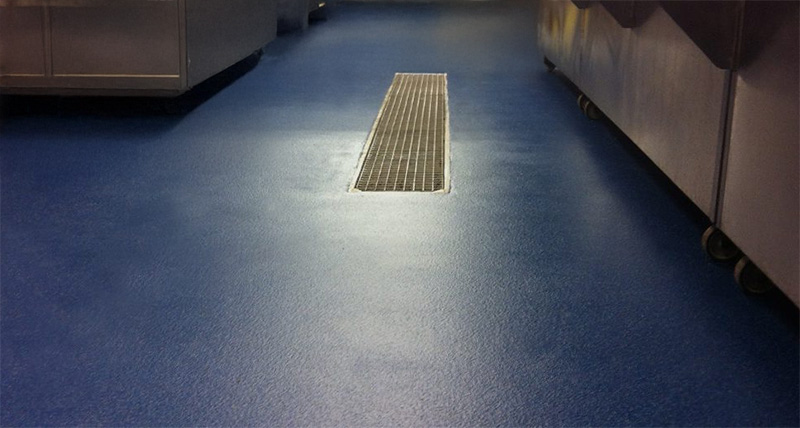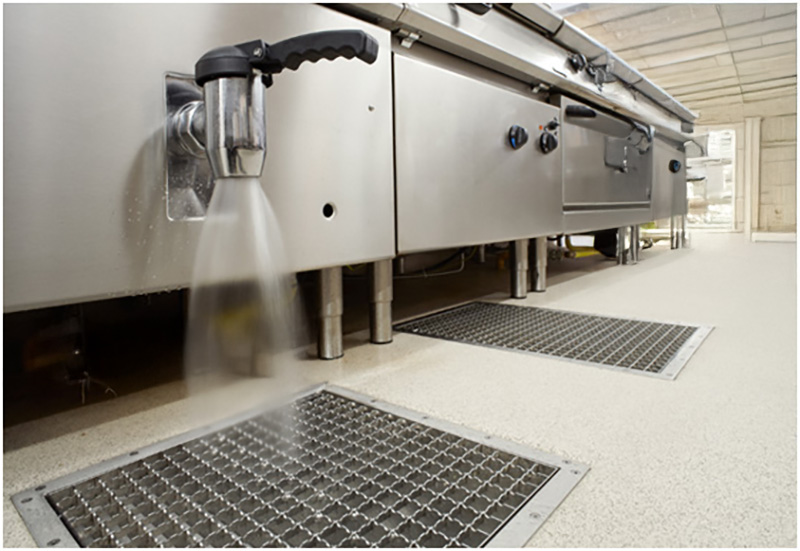Hygienic Floors in Food and Beverage Facilities
Maintaining a clean and hygienic environment is paramount as a food and beverage facility manager. One of the most critical aspects of this is ensuring that the floors in a facility meet the highest standards of cleanliness and safety. Hygienic floors are not just about aesthetics; they play a crucial role in preventing contamination, ensuring employee safety, and maintaining the overall quality of our products. If you are reading this, you are probably already aware of this information, so…
Preventing Contamination
Contamination in the food and beverage industry can have severe consequences, including foodborne illnesses and costly recalls. Floors are a significant source of contamination if not properly maintained. Bacteria, mould, and other pathogens can thrive in cracks and crevices, making it essential to have seamless, non-porous, hygienic flooring. Polyurethane cement flooring, for instance, provides a hygienic floor surface that is easy to clean and sanitise, reducing the risk of contamination.
Ensuring Employee Safety
Employee safety is another critical concern. Slippery or damaged floors can lead to accidents and injuries. Polyurethane cement floors are known for their slip-resistant properties, providing a safer working environment for our staff. This flooring also withstands heavy traffic and impact, ensuring durability and reducing the need for frequent repairs. Yes, it is a top-of-the-line product.
Maintaining Product Quality
The quality of products can be directly affected by the cleanliness of a facility. Floors that are easy to clean and maintain help ensure that production areas remain free from contaminants. Regular cleaning routines, as outlined in guides on maintaining polished concrete floors, are essential for keeping floors in top condition. This not only helps maintain hygiene but also extends the lifespan of the flooring, making it a cost-effective solution.
Types of Flooring Available
Choosing the right type of flooring is crucial for maintaining hygiene and safety in a food and beverage facility. Here are some common types of flooring and their benefits:
- Polyurethane Cement Flooring: Known for its durability, chemical resistance, and hygienic properties, polyurethane cement flooring is ideal for food and beverage facilities. It can withstand heavy machinery, high-impact traffic, and harsh chemical exposure.
- Epoxy Flooring: Epoxy coatings are durable and chemical resistant, making them suitable for industrial settings. They provide a seamless, easy-to-clean surface that promotes hygiene.
- Polished concrete: This excellent surface is fantastic for restaurant areas; it is long-lasting and easy to maintain. Depending on the desired use, polished concrete is a very viable option. it provides a versatile and beautiful surface.
- Acrylic Coatings: These are affordable and easy to apply, offering good UV resistance and various colour options. However, they are less durable than other options and require regular maintenance.
- Vinyl Flooring: Vinyl flooring is also a popular choice due to its ease of maintenance, low cost and variety of designs and patterns. It is also resistant to moisture and stains. However, it is generally only a short-term solution, as it is unsuitable for areas where traffic is high and spills are common.
So what!
Investing in high-quality, hygienic flooring is not just a regulatory requirement but a commitment to excellence in the food and beverage industry. You can ensure a safe, clean, and efficient working environment by choosing the right flooring solutions, such as polyurethane cement, and adhering to strict cleaning protocols. For more detailed information on flooring and maintenance tips, we recommend Diamond Grinds other blog posts.
If you are interested in new hygienic floor options for your facility, contact us for a detailed consultation.

✅ Contact Diamond Grind
by Email or 1800 587 172
for an obligation FREE consultation.
